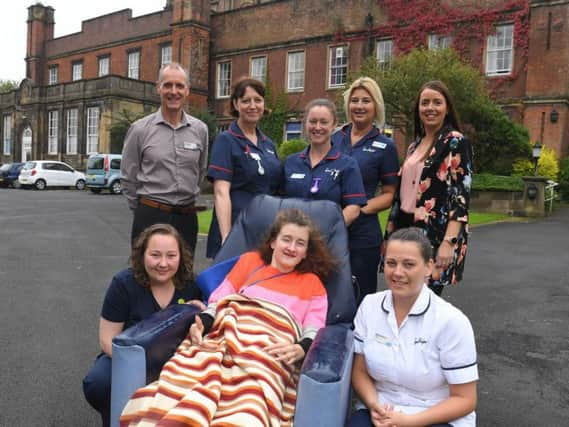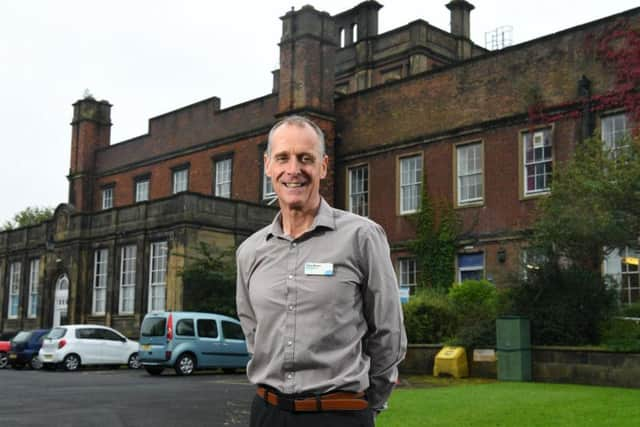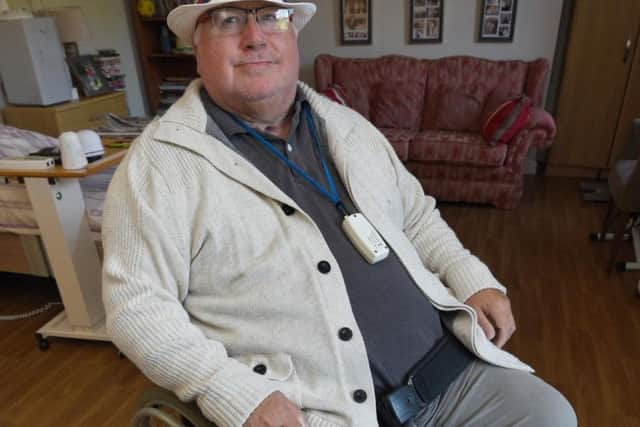Join our £1million Sponsor a Star campaign - and help change a life


Charity Sue Ryder is opening a state-of-the-art specialist neurological care centre in Fulwood, Preston, in March - and we are asking our readers to help raise cash to kit out the centre with things which will help patients live fuller lives.
People living with illnesses such as Huntington’s, Multiple Sclerosis, Parkinson’s or Motor Neurone disease can lose access to hobbies and interests because of their illnesses, which in turn affects their health and mental wellbeing.
Advertisement
Hide AdAdvertisement
Hide AdOur Sponsor a Star fund aims to collect cash to buy items such as an anti-gravity treadmill, which could allow someone with limited mobility to experience a form of running again using a hoist, or a bespoke virtual reality headset - which can realistically simulate a 3D underwater scene for someone unable to take part in scuba-diving in real life.


Terry Mears, centre director at the Sue Ryder Neurological Care Centre, which is currently based at Cuerden Hall, says: “For us, it’s about asking what price do we put on people’s quality of life?
“What are the things that we take for granted that we can just go and do once our day’s work is finished?
“For the people that we see, that’s impossible, but we don’t need to accept that as good enough.
“We need to push the boundaries.


Advertisement
Hide AdAdvertisement
Hide Ad“Health and social care doesn’t cover the chance for people to maintain their hobbies, their interests and their circles of support. That’s not a criticism because there’s just not a pot of money there forever. But how you can deal with that is you can start looking at technology - how do you make it easier for people to keep up with their circles of support?
“How do you make it easier for people to engage with their hobbies? Critically, how do you make it easier for people to communicate?
“We may see somebody who is in a palliative episode for the first time and they may not have any verbal skills. It’s about how we use technology to understand what they’re feeling, what their emotions are.”
Terry’s motivation to help patients make the most out of their lives took on a new dimension when he supported his own father through dementia.
Advertisement
Hide AdAdvertisement
Hide AdHe says: “I was with him up until 18 months ago. I thought dementia was horrendous but it is seriously nothing compared to what I see with Huntington’s Disease.
“It is a horrendous condition on every level and considering a palliative episode can be two to three years and our inability to reach people at that time is one of the saddest most different things I’ve seen as a professional - never mind the family members who have to go through that.
“So I think it is about raising the awareness - we can do something that will make a huge difference.”
‘We want to change things for a generation’
There are many reasons why people come to the Sue Ryder Neurological Centre. Some have acquired brain injuries as a result of a car crash or a stroke. Others have inherited illnesses which affect the brain, such as Huntington’s disease, or develop progressive conditions such as multiple sclerosis, which affects the nervous system.Terry Mears has one common wish for them all - to help them live their lives in the fullest possible way.And the Sue Ryder centre director hopes that - with the help of Lancashire Post readers - the new purpose-built neurological centre in Fulwood will help them to achieve just that.“We’re hoping to change things for a generation,” said Terry. “It’s about creating the head of steam in society to really transform what’s on offer for people right across the UK for people with life-limited neurological conditions. “I think sometimes change doesn’t come from big declarations, it comes from communities saying this is what we’ve done and it grows from there.“In Lancashire, we’ve got a fantastic opportunity to demonstrate what can be achieved.”So what is it that Terry wants to overhaul? When people are diagnosed with neurological conditions, Terry says over time they experience huge loss which paints a bleak picture for their future. “The first loss to come fairly quickly after diagnosis is that they lose their circle of support,” he says. “They then lose their interests and hobbies. “Then what starts to break down is their primary relationships - their partners, their families. “They then lose their home. They become institutionalised and then they die. “That’s the challenge - to turn that on its head. “People come in too soon. Generally, we’ve not established the right support for people to stay in the community.“Someone might have an acquired brain injury say after they’ve been in a car accident.“They might have a fantastic surgery then often what happens is they’re deemed as ‘no further need’ so they are sent to a nursing home.“So there is a short period of rehab and then they’re told they have ‘no future rehab potential’ which means there are no resources for that person’s journey to continue. “We don’t do any magic - we simply offer rehabilitation. “Our new centre is going to affirm that. “The whole aim is about helping people maintain their independence.”
Advertisement
Hide AdAdvertisement
Hide AdDanny Gallagher : ‘A fall left me in a coma - but I’m determined to walk again’
It could have happened to anyone. Former Preston councillor and Liberal Democrat leader Danny Gallagher was at work at a holiday park when he slipped and fell. The accident left him with a catastrophic brain injury.Medics didn’t even think that Danny, only 57 at the time, would survive the air ambulance to hospital.He was in a coma for two days after the accident and when he woke up he was paralysed and unable to speak.But Danny has continued to defy the odds. Bit by bit, Danny is getting his speech back and physios support him walking with a frame on a regular basis. His goal is to be able to walk again and to be able to move back home.But in the meantime, Danny is a charismatic and very popular person at Sue Ryder’s Cuerden Hall. Dog walkers to the grounds at Cuerden Valley Park will also know him well. Danny says: “I sit outside and say hi to all the people and their dogs.” He adds he enjoys “making everyone happy” and “watching everyone come past”.Danny is looking forward to moving to the new Sue Ryder unit at Fulwood and is most excited about the chance of doing some ordinary things he once took for granted - such as “going for a drink at the pub next door”. Daniella and Gemma, Danny’s daughters, said: “Every time we see Dad now, he is able to do something new, speak more clearly or can move in a way he couldn’t before. “When he first came here, the movement on his right side was very limited and one of the biggest things they’ve done is to help him to remember half of his body.”Reliving Danny’s journey since he moved to the Sue Ryder care centre, nurse Charmaine Giles says: “Danny came last year he was a manager of a hotel park and unfortunately he had an accident. “He’d fallen, not from very high but the impact was quite severe to his head. That’s how he ended up with a brain injury. “From what I read in his notes he was quite lucky.“He couldn’t speak, he could only point. He would tell us what he wanted by using hand gestures. His mobility was pretty much non-existent.”But Charmaine says she is proud of how far Danny has come since that point. “They have built him up,” she says. “He walks himself with a frame and physios will be walking behind him with a wheelchair.“They have just kept it up on a daily basis which has helped him greatly. “He’s come along a great deal. Each day he’s getting better. He loves eating, he loves his puddings, he’ll ask for three ice creams. He’s a fantastic character. “I’m personally just so proud of how far he’s come. It’s just wonderful to see. “It can only get better.”
Christmas Wish List
£370 – will buy a TV for a resident’s room to occupy them in the evening and allow them to catch up on their favourite programmes. TV can enable people to share experiences and stories with others.
£2,000 – will buy a specialist bed and mattress. People with neurological conditions can have restricted movement, so this can enable a resident to sit up, lie down and re-position their legs.£3,000 – will furnish the day service room – a fun and exciting environment for all residents to enjoy and socialise in.
Advertisement
Hide AdAdvertisement
Hide Ad£8,000 – will build an occupational therapy kitchen to help with the rehabilitation for people with complex neurological conditions and acquired brain injuries. This can allow them to regain functional mobility and independence, rather than relying on someone to make them a cup of tea or prepare food.
£14,000 – will buy a specialist bath which promotes a sense of well-being for residents and eases the muscles and relaxes the mind. These baths are accessible for all residents.
£113,000 – will buy hoist tracks and motors to be able to safely move residents with mobility issues from their bed, to their bathroom and into a wheelchair.HOW TO DONATEReaders are welcome to donate any amount to the appeal. Anyone who donates £10 or above will have their names included in our Sponsor a Star article in the paper, just before Christmas.
Sponsor a Star
To donate, go to www.sueryder.org/makeadonationOr send a cheque to:Lancashire Post Appeal, Supporter Care, Sue Ryder, 183 Eversholt Street, London, NW1 1BU